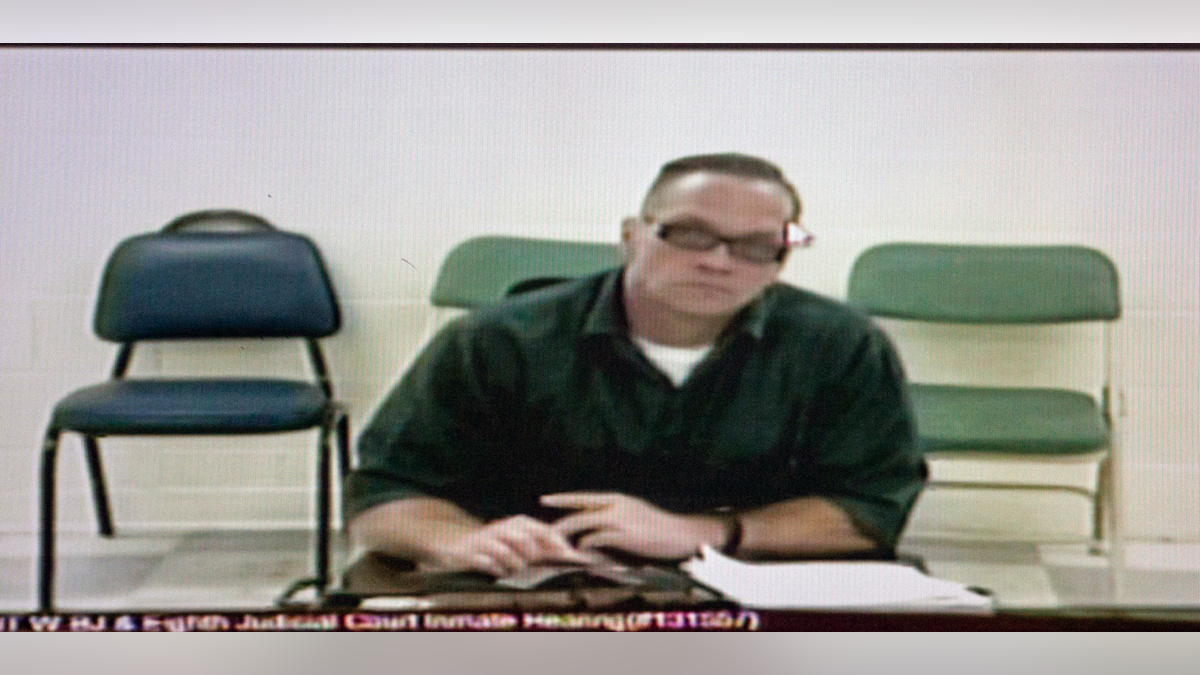
FILE - In this Dec. 5, 2017, file photo, Nevada death row inmate Scott Dozier appears for his court hearing via video at the Regional Justice Center in Las Vegas. Nevada prison officials say death row inmate Dozier has gone to great lengths to try to kill himself while awaiting execution, including attempting to obtain a fatal drop of a deadly drug on a piece of paper sent through prison mail. (Erik Verduzco/Las Vegas Review-Journal via AP)
RENO, Nev. – Prison officials say Nevada death row inmate Scott Dozier has gone to great lengths to kill himself while awaiting execution, including attempting to obtain drops of a deadly drug on a piece of paper sent through prison mail.
They also intercepted mail from the convicted killer's sister with instructions on how to cut the jugular vein in his neck and that he turned over razor blades he somehow secured behind bars.
The claims are in documents state lawyers filed last week in federal court in response to Dozier's lawyers' attempts to keep him out of an isolation cell where he was being held on suicide watch.
He is waiting for what would be Nevada's first execution in more than 12 years. The execution was put on hold in September when a judge banned the use of expired drugs for a lethal injection.
U.S. Magistrate Carla Baldwin Carry refused a defense motion earlier this month intended to ensure Dozier remains confined with other death row inmates, but is allowing his public defenders to file additional documents amending their claims.
The legal battle includes Dozier's own statements that he wants to be put to death, his federal public defenders' argument that placing him in an isolation cell makes him more likely to attempt suicide and the state's insistence it must protect him from self-harm.
Dozier's lawyers say he apparently cut his neck and wrist with a razor in October. They argue his deteriorating condition is the result of his unconstitutional treatment, including his denial of recreation time in the prison yard. They say he can't socialize with others, read, communicate with his family and effectively consult with legal counsel.
They're seeking a temporary restraining order to prevent his return to isolation.
Nevada Deputy Solicitor General Jordan Smith said in papers filed Friday Dozier's current legal counsel, federal public defenders and other anti-death penalty groups "have thwarted the professional wishes of its own client by filing court actions that have prevented Dozier's execution."
"Dozier has repeatedly informed (prison) officials ... he will take matters into his own hands and end his own life if the state is unable to carry out the execution in a timely manner," Smith wrote.
Prison staff discovered a plot by Dozier Sept. 21 "to obtain drugs in a highly concentrated form dropped onto a page of a letter through the mail," he said. Staff later confiscated a letter instructing him to write to another inmate with an example of images of hearts to be drawn around the droplets.
The specific liquid drug wasn't known but fentanyl was a likely possibility because the synthetic opiate is not detectable by prison test kits, Smith said.
In October, Dozier's sister attempted to provide him with a detailed anatomy textbook with information specifying the best way to ensure death by cutting the jugular or major neck arteries, Smith said. He said guards intercepted two pieces of mail from his sister with a hand-written diagram of the cardiovascular system. One said it "takes about 2 minutes to bleed to death if the internal jugular is cut."
On Oct. 17, Dozier provided prison staff two razor blades and nail clippers in his possession, Smith said.
"Given that his family was attempting to help him learn how to cut his throat, it was objectively reasonable to restrict certain phone calls," Smith wrote. Those concerns ended Nov. 2 and Dozier was returned to death row.
"But any court ruling preventing the state from protecting Dozier's well-being, if needed, may have the effect of facilitating Dozier's suicide."
In a separate case, state Attorney General Adam Laxalt has until Dec. 26 to file his latest briefs in an appeal to the state Supreme Court of a judge's ruling in September that the state can't use its preferred mixture of three drugs to put Dozier to death because prison officials obtained drug manufacturer Alvogen's sedative midazolam through "subterfuge," or deceit.
The state's prison director, James Dzurenda, testified earlier that he disregarded letters from three drug manufacturers who did not want their medication used in an execution.
Dozier has been on death row since 2007 for his murder convictions in the separate killings of drug trade associates in Phoenix and Las Vegas in 2002.








































